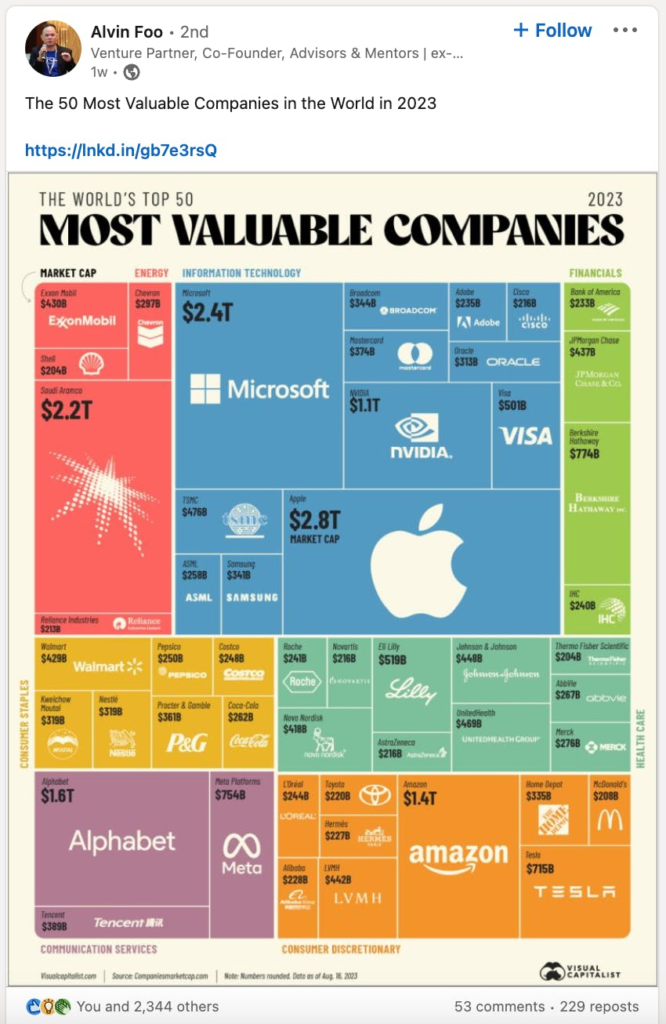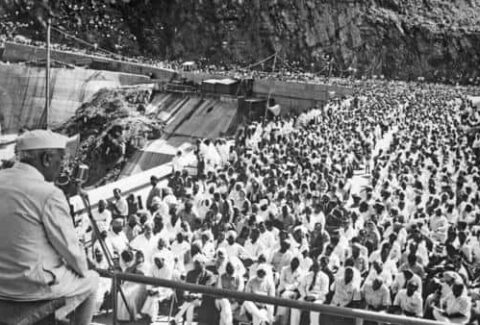Gladwell’s taxonomy of cop stories
Welcome to the twenty-eighth edition of ‘3-2-1 by Story Rules‘.
A newsletter recommending good examples of storytelling across:
- 3 tweets
- 2 articles, and
- 1 long-form content piece
Let’s dive in.
🐦 3 Tweets of the week

Everyone working in consumer research should frame this quote on their desk!

Great use of the treemap chart to show the split of market cap across industries and companies. So many interesting messages in there.

Hahaha. Consulting does this to people – I’m guilty as charged. But honestly, this book changed my life!
PS: I think the wrong spelling is intentional!
📄 2 Articles of the week
a. ‘Why Isn’t Ukraine a Global Superpower?’ By Tomas Pueyo
Tomas is back at what he does really well – explain current events (and history) through the medium of geography.
This eye-opening piece tells you how Ukraine is so well endowed… but lacks the natural defences to protect itself from powerful neighbours:
Ukraine is lucky enough to have some of the best land in the world:
– It is fertile, with flat plains, sufficient rain, rivers for agriculture and silt, and chernozem, the most fertile soil in the world.
– It’s perfect for trade, with rivers for north-south exchange, flat steppes for east-west trade, and access to the sea for trade with the Mediterranean and the rest of the world.But alas, it’s too good. Bad luck for Ukraine: Everybody wants it.
It can’t defend itself easily. Covetous neighbors can attack it because it doesn’t have enough natural defenses:
– Horseback-riding nomads have been roaming Ukraine (and fighting for it) unimpeded since time immemorial: Scythians, Huns, Khazars, Mongols, Golden Horde, Khanates, Cossacks…
– Peoples from the north have been moving down on Ukraine since time immemorial: Slavs, Varangians, Kievan Rus’, Poland-Lithuania, Russia…
– The coast has been controlled since time immemorial by Mediterranean powers: Greece, Rome, Constantinople, the Ottoman Empire…
Each one of these powers took over the region, but it was nearly impossible to keep it. Because there are no natural defenses.
Ukraine was always exposed to different threats from steppes, rivers, and the sea. It’s impossible to specialize defenses to all three, so Ukraine could never mount a serious defense against any of them.
Sometimes, it’s bad to have too much potential. That’s why, to this day, Ukraine is a poor country invaded yet again by a neighbor.
The Himalayas (and the seas) are among India’s greatest geographical endowments.
b. ‘Tell Me A Story’ by Scott Galloway
Scott replugs this old piece with some updates. This is some great writing:
Entrepreneur is a synonym for salesperson, and salesperson is the pedestrian term for storyteller. Pro tip: No startup makes sense. We (entrepreneurs) are all impostors who must deploy a fiction (i.e. story) that captures imaginations and capital to pull the future forward and turn rhyme into reason. No business I have started, at the moment of inception, made any sense … until it did. Or didn’t. The only way to predict the future is to make it.
This is not the same as lying. There’s a real distinction between an entrepreneur and a liar: Entrepreneurs believe their story will come true. This requires confidence … and delusion. It helps to be somewhat detached from reality — to assume that, for whatever reason, you are the one who can see into the future, and that in the new world your product/service will be needed and successful, despite overwhelming evidence (i.e. the current reality) that it’s not. A reality distortion field if you will.
More than an ode to the power of story, this cautionary piece advises us to not get too swayed by charismatic storytellers.
🎤 1 long-form listen of the week
a. ‘Taxonomy of the Modern Mystery Story’ on Revisionist History by Malcolm Gladwell
I thoroughly enjoyed this engaging take by Malcolm Gladwell on how the police are portrayed in movies, TV series and books. He employs an interesting classification technique to divide cop fiction into four categories:
- Westerns: Where the police are absent and don’t even feature in the story (e.g. Jack Reacher novels)
- Easterns: Where the police are impeccably professional, skilled and fair (E.g. Dragnet or India’s own Crime Patrol)
- Northerns: Where the police are well-intentioned but inept and look to the private detective’s brilliance to solve cases (e.g. Sherlock Holmes, Hercule Poirot)
- Southern: Where the police are unmistakably corrupt and degenerate (e.g. John Grisham)
He then goes onto discuss how these stereotypical narratives impact real-life in negative ways… and suggests that writers should come up with more nuanced stories based on the complex, messy reality.
A fascinating listen.
That’s all from this week’s edition.
Photo by Matt Popovich on Unsplash







